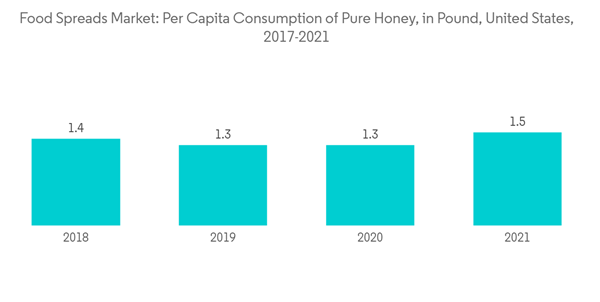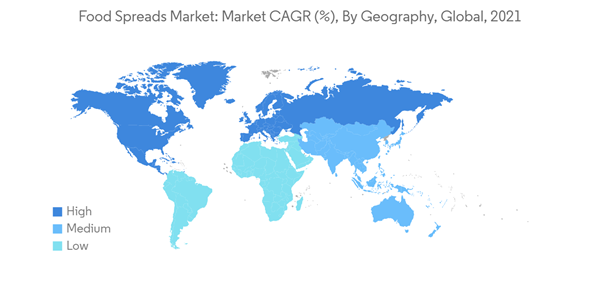Sweet spreads are an integral part of every breakfast, leading to the steady growth of the spread market. Different types and flavors of spreads are available in the market, driving consumers to purchase the products. The rising health consciousness among consumers has given way to new low-calorie spreads. Due to these varieties of flavors, the demand for spreads among children is more. The increasing trend of plant-based and vegan food drives the market players to innovate new products.
Additionally, clean-label products are expected to drive the market over the medium term owing to consumers' awareness of the nutrients present in products. The market players are launching their products in distribution channels like supermarkets and e-commerce websites. Due to this, consumers are getting more options for brands and flavors. The use of spreads is also growing in the bakery and confectionary sectors. Therefore, market players are launching products accordingly. For instance, in March 2021, Nestlé Italia launched a spread version of its Baci Perugina chocolate brand. The company launched Creme Baci, a gluten-free and palm oil-free sweet chocolate spread with crunchy hazelnut grains. Creme Baci would be available in both large-scale retail distribution and e-commerce channels and in select pastry shops in Italy.
Food Spreads Market Trends
Increase in Demand for Organic and Natural Food Spreads
The food spreads market is growing in the market, owing to busy lifestyles and lack of time. Consumers prefer food spreads for breakfast over bread in the morning. Various flavoring agents, preservatives, and sweeteners are added to different products to extend their shelf-life. Demand for honey as food spreads is increasing in the market owing to its natural source, health benefits, and innovations in honey making. Market players are introducing new honey jars with no artificial sweeteners and minimal processing, gaining consumer attention. For instance, in December 2022, Conscious Food, a pioneer of organic food products in India, launched new raw unprocessed Himalayan multiflora, honey. The product is unfiltered and unpasteurized, containing honey's natural taste and nutritional benefits.Furthermore, the increasing demand for low-calorie, plant-based, sugar-free products is driving consumers to produce innovative spreads to cater the consumer requirement. Additionally, the trend of vegan food is growing, so the market players are introducing vegan spaces. For instance, in July 2021, the Italian healthy food brand Fabulous launched its first vegan chocolate spread. The product is made from organic hazelnuts, cocoa, and chickpeas.
North America Holds the Major Share
The popularity of food spreads can be attributed to their prevalence in traditional breakfasts in North America. In recent years, the spread market has developed further, with the launch of new innovative flavors, such as nuts and exotic fruits. According to the current trend, North American consumers prefer premium-quality products that do not contain artificial ingredients and with nutritional claims. They are demanding better-for-you products that are easy to prepare and appetizing at the same time. Vendors are strategizing by this requirement and rolling out healthier and indulgent offerings in the region. The government policies also lead to the creation of healthy food spreads in the region. The consumption levels of food spreads are affected by increased consumer awareness due to extensive marketing and consumer engagement strategies adopted by most manufacturers. In December 2021, Superfoodio a plant-based snacks startup announced the launch of revolutionary on-the-go peanut butter buttons product line in the market with four different flavors of butter such as Coco Crunch, Original, Original Plus, and PBJ.Food Spreads Industry Overview
Unilever PLC, The Hershey Company, Ferrero International S.A. (Nutella), Conagra Brands Inc. (Dunken Hines), Hormel Foods LLC, and The J M Smucker Company (Jif, Smucker's) are some of the major players in the global market. These companies provide a range of food spreads, including natural and conventional choices for consumers. Mergers and acquisitions between companies are helping the market to grow at a faster rate. Product innovations and increasing demand for vegan spreads are one of the drivers for the market. Market players are focused on consumer demand, innovating products by considering the food trends and changing the food habits of consumers. In April 2022, a Marico brand Saffola launched Saffola Peanut Butter. Jaggery substitutes refined sugar in Saffola Peanut Butter. It provides 31% of the RDA for protein and includes no refined sugar. It is available in two variants: "Crunchy' and "Creamy."Additional Benefits:
- The market estimate (ME) sheet in Excel format
- 3 months of analyst support
This product will be delivered within 2 business days.
Table of Contents
Companies Mentioned (Partial List)
A selection of companies mentioned in this report includes, but is not limited to:
- The J. M. Smucker Company
- The Kraft Heinz Company
- Unilever PLC
- Conagra Brands Inc.
- Nestlé S.A.
- Hormel Foods LLC
- Ferrero International S.A.
- Premier Foods Group Services Limited
- Sioux Honey Association Co-op
- B&G Foods, Inc.
- Ingenuity Brands
- The Hershey Company










